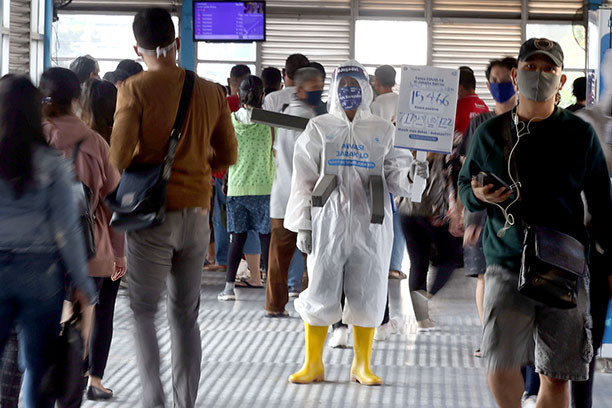Govt sets up new joint COVID-19 response team
Change Size

T
he government launched on Monday a new team to tackle both the public health and economic aspects of the COVID-19 pandemic as the country’s economy restarts amid a surge in cases.
The National Economic Recovery and COVID-19 Response Team will be led by Coordinating Economic Minister Airlangga Hartato as chairperson and State-Owned Enterprises (SOEs) Minister Erick Thohir as executive chairperson.
“We do not want the public to misinterpret the ‘new normal’ term by returning to their activities freely without complying with [public health] protocols. At the end of the day, the economy will suffer,” Erick told a virtual press briefing. The team will come up with an outline of a plan by Tuesday and submit it by Wednesday to the team chairman.
Head of the economic recovery task force Budi Gunadi Sadikin and head of the COVID-19 response task force Doni Monardo will join the team to coordinate and integrate the country’s policies on handling the pandemic from the public health and economic aspects.
The establishment of the new team comes at a time when Indonesia’s confirmed COVID-19 cases surged following the government’s decision to reopen the economy. Indonesia’s confirmed COVID-19 cases surpassed the official toll in China on Saturday, reaching 88,214 on Monday, with 4,239 dead.
Enny Sri Hartati, an economist at the Institute for Development of Economics and Finance (Indef), said Indonesia needed better leadership rather than a new government team. The main problem hindering the country’s COVID-19 response was miscoordination between government ministries and regional administrations, she added.
When the Jakarta administration was planning to suspend intercity and interprovincial buses in late March, for example, the then acting transportation minister Luhut Pandjaitan blocked the plan.
The Industry Ministry also issued its own coronavirus guidelines that allowed factories to open amid the large-scale social restrictions, when the Quarantine Law actually stipulated a suspension of workplace activities.
“There is no synergy between government ministries or agencies,” Enny said in a phone interview. “This is evident in the fact that very little of [the COVID-19 response budget] has been spent.”
As the pandemic worsens, Bank Indonesia (BI) has forecast that domestic economic growth will contract by 4.8 percent year-on-year in the second quarter of 2020. The Finance Ministry expects the country to fall into recession in the third quarter of the year. Indonesia’s GDP growth fell to a 21-year low in the first quarter, at 2.97 percent year-on-year.
President Joko “Jokowi” Widodo signed on Monday a presidential regulation to establish the team to optimize coordination between government ministries and agencies, said Airlangga.
The team also comprises the Coordinating Minister of Maritime Affairs and Investment, the Coordinating Legal, Political and Security Affairs Minister, the Coordinating Human Development and Culture Minister, the Finance Minister and Home Minister.
“The task is to oversee the national economic situation and COVID-19 developments, including the availability of test kits, vaccine and antibody production, as well as multilayered economic programs,” said Airlangga. Economic recovery “will take time”, he added.
The economic recovery task force will map out sectors hit hardest by the pandemic and consult with other government ministries and regional administrations to design a program in response, said Budi, who also serves as deputy SOEs minster.
Budi said on Monday the government would maintain the current national economic recovery policy, including social assistance. The government has allocated Rp 695.2 trillion (US$47.6 billion) for its COVID-19 response. The largest chunk of the budget is allocated for social safety net programs.
“One of our main tasks is maintaining Indonesia’s economic growth,” said Budi. “We will maintain it by protecting jobs and people’s purchasing power.”
With additional support from the team, the government is planning to step up its testing capacity to 30,000 specimens per day, according to Doni, who also serves as the head of the National Disaster Mitigation Agency (BNPB). The government is currently testing around 20,000 specimens every day.
The plan to increase testing is designed to better detect infected people as regional administrations have reported that 80 percent of confirmed cases show no symptoms.
“We hope this collaboration can increase collective awareness and public compliance,” said Doni. “If compliance can improve, we hope the cases will decline.”
Bhima Yudhistira, an economist at Indef, said on Monday that there should be no trade-off between public health and the economy if the government could speed up the disbursement of the COVID-19 stimulus, especially the social aid.
“It is somewhat nonsensical to expect people to return to grocery stores and offices when the confirmed cases are still rising,” Bhima told the Post in a phone interview. “The urgent thing to do is to strike a balance between public health and the economy by getting the pandemic under control.”









